This Play Features Law Enforcement Officers Performing The Words Of Undocumented Immigrants
On the afternoon of April 30, in front of a crowd of over 100 people at the Dairy Arts Center in Boulder, Colorado, Mike Butler, the public safety chief of the nearby town of Longmont stood up and went to the microphone.
This is what he said:
Do you know who I am? Do you? Do you know who I am? Well, think before you say anything because of course, you don’t know who I am. You don’t know me. And yet all kinds of people, when they find out I was born in Mexico, they act like I’m a criminal. I am not a criminal. I am not a criminal!
I am not here to steal money or take anyone’s life for no reason. I am here to help, help anyone who needs my help. That is why I was born. Whether that be in Mexico or the U.S., I was born to help. That is simply who I am. There are so many people dying of hunger, living on the streets with no help, and yet people think I’m here so I can have a lot of kids and get food stamps without paying any taxes or so I can get a check from the government and spend it all on myself.
Butler was speaking from a monologue by Hugo Juarez, an undocumented immigrant who came to the U.S. from Mexico when he was 12 years old. Juarez wrote the monologue for Do You Know Who I Am? a production run through the Boulder-based Motus Theater and made up of a series of true stories written and performed by local undocumented immigrants. Kirsten Wilson, the artistic director of Motus Theater, tells Fast Company that she first approached local immigrants-rights groups to work with a handful to narrativize and perform their experiences in 2013. For the past three years, she says, Motus has toured Do You Know Who I Am? and reached 4,000 people in a state where the population of undocumented immigrants hovers around 164,000–the 14th highest in the U.S.
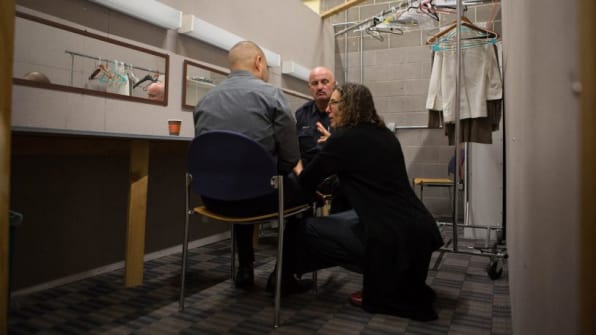
“After the election in November, it became very clear that Motus Theater needed to be very strategic about how it was going to engage people in the conversation around immigration,” Wilson says. “In particular, we were worried about the connection between immigrants and criminality–it’s false and statistically inaccurate.” When he announced his bid for the presidency in June 2015, Donald Trump said: “When Mexico sends its people, they’re not sending their best… They’re sending people that have lots of problems, and they’re bringing those problems with us. They’re bringing drugs. They’re bringing crime. They’re rapists.” Over the course of his campaign and his regime, his rhetoric has not evolved.
So for the post-election iteration of Do You Know Who I Am? Motus Theater went straight to the heart of the issue and enlisted local law enforcement to read out the immigrants’ monologues. Wilson began by approaching Stan Garnett, the district attorney for Boulder County, who had long been active in supporting immigrant safety and who agreed to help reach out to other law enforcement leaders, as did Boulder County Sheriff Joe Pelle. Two police chiefs initially refused, Wilson says, but changed their mind after talking with Wilson, Garnett, and Pelle. The law enforcement officials involved, Wilson says, saw the performance as a way to “get a message out to the immigrant community that they are not working with [Immigration and Customs Enforcement].”
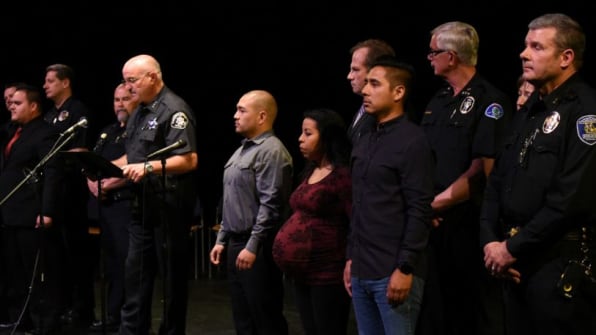
During the April 30 performance, the monologue’s authors stood by the officers’ sides as they spoke their words. The full production is now available for streaming on the Motus Theater site, and Wilson says that she, the undocumented community, and law enforcement are in talks about how to expand the reach of the production and this type of exercise in empathy beyond Boulder.
The six original undocumented performers of Do You Know Who I Am? Wilson says, “are part of a group who have changed the conversation around immigration nationally by being willing to come forward and tell their story.” They had never before heard their experiences shared by someone else, but “they thought that this was a really important time to–if we’re using police lingo–call for backup,” Wilson says.
In reading out the stories of the undocumented immigrants, the law enforcement officials, Wilson says, are not speaking for them. Instead, Victor Galvan, one of the original performers and an organizer with the Colorado Immigrant Rights Coalition, says that speaking someone else’s narrative serves to highlight the similarities across two people’s seemingly vastly different experiences. “The reason why our monologues are so relatable is because they touch on things that are ingrained in us as people,” Galvan says. “We talk about letting down our parents, losing grandparents. We talk about work and school and the everyday things that make us human.”
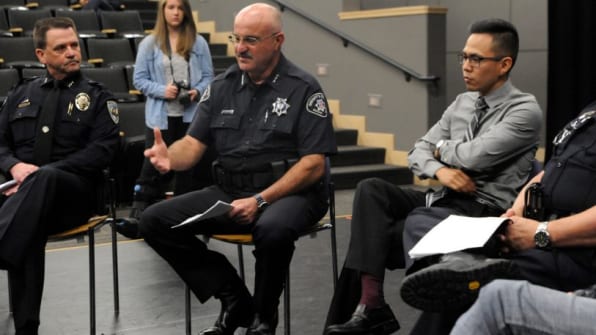
For the officers involved, participating in the play entails recognizing that, as Wilson says, “their job is to be responsible for the safety of every person in our community, regardless of their documentation status.” It’s easier, Wilson says, for officers “to go along with policies, and not worry about the ramifications of those policies on individuals in your community if you don’t know them.” The officials who volunteered to participate in Do You Know Who I Am? joined the production already on the side of protecting the undocumented community; in March, Butler wrote a letter to the Times-Call making clear his stance on cooperating with immigration authorities. “Our immigrant community needs to feel safe and to know they can access our services,” he wrote. “If they don’t, they are likely to be exploited by those who wish to prey on a vulnerable community.”
Yet the experience of inhabiting the perspective of an undocumented person drove home the reality of living in our current hostile climate, even to already sympathetic officers. When Pelle was contacted several months ago about participating in the Motus production, he took on the story of Juan Juarez, a young man who came to Colorado when he was 14. Despite having gone through school in Colorado, “due to the current political climate and immigration priorities, he’s afraid,” Pelle tells Fast Company. Reading Juarez’s story, Pelle says he was struck by how, despite what he describes as decades of work to foster trust within the local Latino community, through working on pro-immigrants-rights policy to organizing toy drives, the heightened tensions around immigration were undermining those efforts. “People want nothing to do with cops, they have no reason to trust us,” Pelle says.
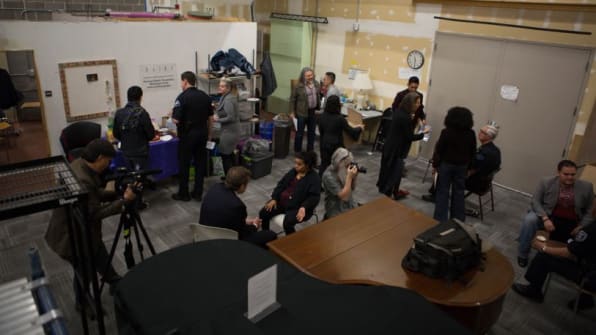
Going through the process of sharing Juarez’s story, Pelle’s attitude is now even more firmly cemented around fostering that trust. “My philosophy is that local police have no constitutional or statutory authority to enforce federal immigration policies, nor should we seek it because it erodes trust,” he says. While the federal government continues to pressure local police authorities to carry out immigration detention and interrogation, Pelle says Boulder will resist; it’s already declared itself a sanctuary city. “The fight is on,” he says.
“The police chiefs are now the holder of these stories, in a way,” Wilson says. “And that comes with a responsibility for them.”
While the production of Do You Know Who I Am? pulled from the Boulder community, Galvan says it’s an exercise that can and should take root in communities across the U.S.–and could perhaps reach and influence officers not as open-minded as those who originally volunteered to participate in the production. “On an individual basis, this is the work that needs to happen if we want to see America move toward a more inclusive and accepting narrative,” Galvan says. “Sharing stories, actually talking to police officers one-on-one, that’s what will really change hearts and minds.”
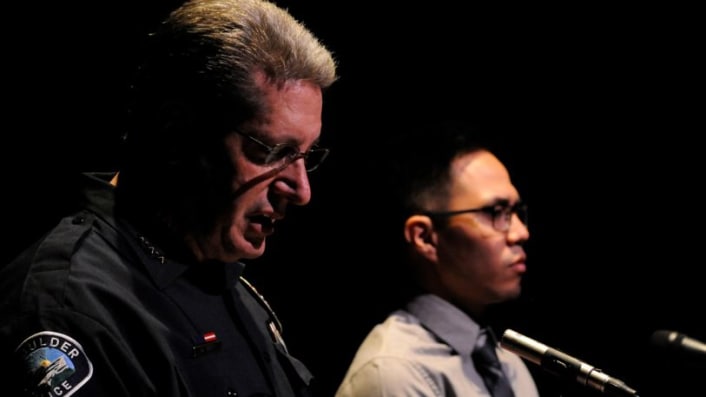
For the post-election iteration of Do You Know Who I Am? Motus Theater went straight to the heart of the issue and enlisted local law enforcement to read out the immigrants’ monologues. [Photo: Michael Ensminger/courtesy Motus Theater]

It began by approaching Stan Garnett, the district attorney for Boulder County, who had long been active in supporting immigrant safety and who agreed to help reach out to other law enforcement leaders [Photo: Michael Ensminger/courtesy Motus Theater]

he law enforcement officials involved saw the performance as a way to “get a message out to the immigrant community that they are not working with [Immigration and Customs Enforcement].”[Photo:Jill Kaplan/courtesy Motus Theater]
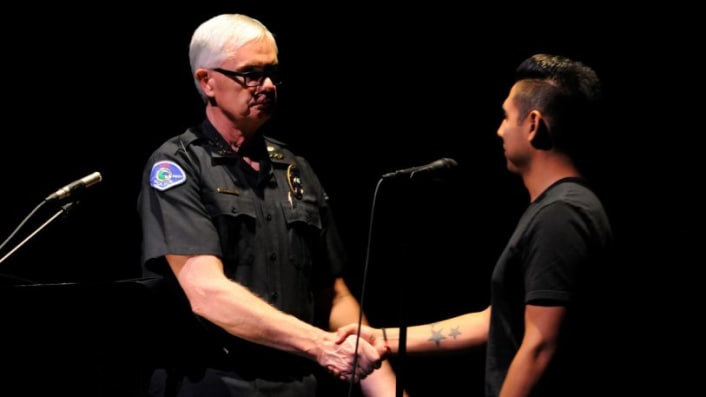
During the April 30 performance, the monologue’s authors stood by the officers’ sides as they spoke their words. [Photo: Michael Ensminger/courtesy Motus Theater]

The six original undocumented performers of Do You Know Who I Am? “are part of a group who have changed the conversation around immigration nationally by being willing to come forward and tell their story.” [Photo:Jill Kaplan/courtesy Motus Theater]
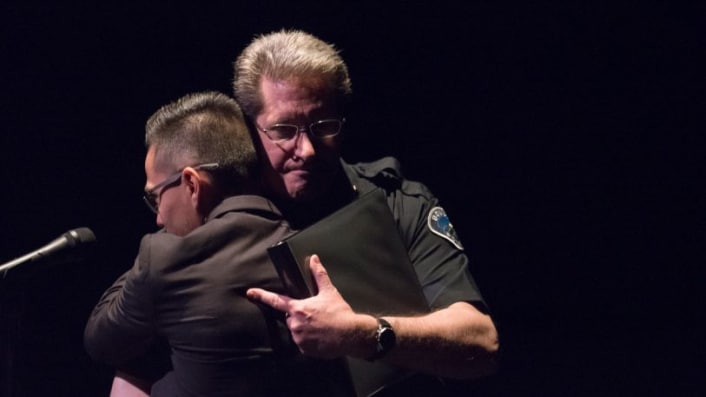
They had never before heard their experiences shared by someone else, but “they thought that this was a really important time to–if we’re using police lingo–call for backup.” [Photo: Michael Ensminger/courtesy Motus Theater]
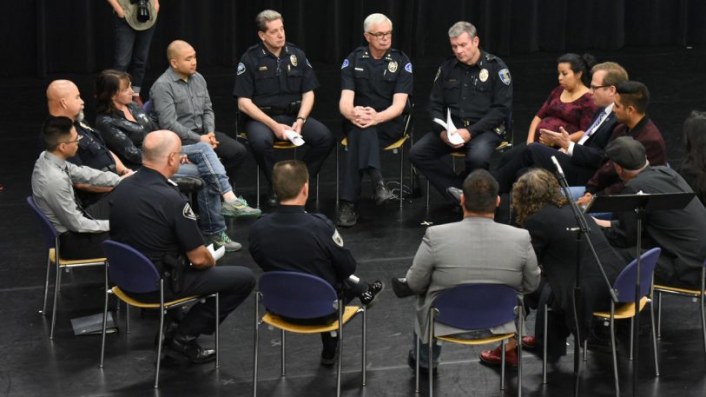
For the officers involved, participating in the play entails recognizing that “their job is to be responsible for the safety of every person in our community, regardless of their documentation status.” [Photo: Michael Ensminger/courtesy Motus Theater]

The experience of inhabiting the perspective of an undocumented person drove home the reality of living in our current hostile climate, even to already sympathetic officers. [Photo: Michael Ensminger/courtesy Motus Theater]
(44)



